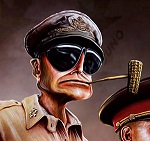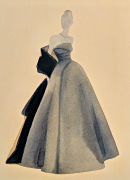|
Hogge Wild posted:Even though Iím somewhat a landsman, the naval jargon wasnít that difficult. If you encounter a new word just put it in a search engine and you get an explanation and probably even a nice picture too. I know a bit of the jargon, but even the more obscure stuff I could usually figure out through context, or at least get the gist of what was meant. Looking stuff up is interesting, but if I'm not near a way to use google or if I just can't be bothered, it's been fine for me to go "a nautical thing happened to some ropes and the ship went faster" and just keep reading. I pretend it's Maturin's POV, I guess. I need to start reading these again. I'm partway into The Surgeon's Mate but I got distracted by other books.
|
|
|
|

|
| # ? May 16, 2024 19:34 |
|
I learned recently that many of the English place names mean something dirty. Eg. the Reverend Mr Hinksey who was the new rector of Swiving Monachorum was really the new rector of loving of Monks.
|
|
|
|
I just finished Master and Commander for the first time. I'm surprised I actually laughed out loud during it, I was expecting something really anal about rigging and mizzens and so on. It's really oddly paced by modern standards, in that it'll leap several weeks in a paragraph and that the ending with the super big battle is basically seen from a distance at night by the two main characters, then they go into the bosses office and get pardoned, The End. Part of that super big battle as described is that one of the British ships sailed in between two Spanish ones and gave a double broadside that concealed it to such an extent that the Spanish didn't realise it had sailed past and kept shooting at the smoke thereby destroying each other. Was such a thing possible? It seems odd to me that in the several minutes it would take to reload a broadside that either the smoke wouldn't clear enough or nobody on the Spanish ships would not see the British ship sailing onwards. I know nothing at all about naval combat 
|
|
|
|
Almost all the big battles, especially in the early books, are based closely on actual period accounts of real battles. In that sense they're almost nonfiction.
|
|
|
|
|
Eau de MacGowan posted:It seems odd to me that in the several minutes it would take to reload a broadside that either the smoke wouldn't clear enough or nobody on the Spanish ships would not see the British ship sailing onwards. I know nothing at all about naval combat Ships routinely sailed a cable's length apart (1/10th of a mile, which is roughly 200 yards, I think), mainly because ships were big heavy bastards that took a long time to turn. Now, this being a night action, everything is damned dark. Like really dark. Ever gone camping somewhere that has little enough light pollution to let you see the Milky Way? It's darker than that. Now this ship that has its lights hidden, and wouldn't have many of them anyways because flame+powder=bad, sails up between you and your buddy and lets off a bunch of really bright flashes. Congratulations, you're now night-blind. After the three to five minutes have passed that are necessary for you to clear your ship for action (at least minimally), your vision is recovering and you see a ship in roughly the right place. So you fire on what is actually your buddy since the other ship was fast enough to get out of the way in the intervening time*. Your buddy, who got the same treatment as you, replies in kind. Now, since you're not one of those captains who believes that long-range accurate fire is necessary, you follow the conventional wisdom of the time and close with this bastard that's shooting you. You get really close, like close enough that your shots can't miss if you tried. Flaming wads start hitting both ships and sooner or later one of those fires takes root. Flames spread, and eventually kaboom. The other ship, now not only on fire but probably missing half its crew due to explosion-related injuries, also blows up for similar reasons. *1 mph = 1.47 fps. 88 feet in a minute, 264 in 3, 440 in 5. And that's assuming it was only sailing 1 knot (which isn't 1 mph, but it's close enough) faster, when it was probably sailing 2 or 3 at least.
|
|
|
|
Eau de MacGowan posted:It's really oddly paced by modern standards, in that it'll leap several weeks in a paragraph[/spoiler] This threw me off when I first started reading the series. Over time though, it has made me a much more careful reader. I don't skim like I used to.
|
|
|
|
ItalicSquirrels posted:Now, since you're not one of those captains who believes that long-range accurate fire is necessary, you follow the conventional wisdom of the time and close with this bastard that's shooting you. I always figured it wasn't that they didn't believe long-range accurate fire was necessary so much as they they didn't figure it was possible. They're on a mobile gun platform that's moving in all three dimensions, firing at another platform that's moving in all three dimensions, only at different speeds and in different directions. The guns are heavy, slow to reload, difficult to aim precisely under shipboard conditions, and they're fixed to the broadside. And, relative to the toughness of a ship, they're not that powerful, so you're going to need a lot of hits to do the job. It seems to me that you'd almost have to close with the enemy to really have a shot at anything decisive.
|
|
|
|
I do American War of Independence reenacting, and while it's on land and not at sea, I have a personal anecdote that helps with this, too. We were at a weekend event, and it had rained all morning. Then the sun came out and it was humid as all hell. No wind, so the air was just wet and thick. We had a street battle, and after the first two volleys from either side, all I could see of the enemy were their shoes and the occasional flash of light. The powder smoke was so thick, it was like being in a stinky, sulfuric cloud. And that was during the day. At night it would've been worse.
|
|
|
|
Khizan posted:I always figured it wasn't that they didn't believe long-range accurate fire was necessary so much as they they didn't figure it was possible. They're on a mobile gun platform that's moving in all three dimensions, firing at another platform that's moving in all three dimensions, only at different speeds and in different directions. The guns are heavy, slow to reload, difficult to aim precisely under shipboard conditions, and they're fixed to the broadside. And, relative to the toughness of a ship, they're not that powerful, so you're going to need a lot of hits to do the job. Funnily enough, the Brits were known for trying the difficult shots more than the French. Rear Admiral Sir John Leake criticized the French 'manner of firing chiefly wounding the masts and rigging (as if to secure a retreat rather than a victory)' during the Battle of Malaga. The Brits by reputation largely aimed at the more difficult to hit hull. Really it's hard to say whose theory of gunnery was better. The French often gave as good as they got leading up to the revolution. After the terror, the French naval officer corps was decimated, and with it the ability to quickly train up good crews. Trafalgar was more an illustration of the perils of leading ill trained men than an indictment of either side's fighting prowess. Raskolnikov2089 fucked around with this message at 06:56 on Dec 3, 2013 |
|
|
|
Khizan posted:I always figured it wasn't that they didn't believe long-range accurate fire was necessary so much as they they didn't figure it was possible. They're on a mobile gun platform that's moving in all three dimensions, firing at another platform that's moving in all three dimensions, only at different speeds and in different directions. The guns are heavy, slow to reload, difficult to aim precisely under shipboard conditions, and they're fixed to the broadside. And, relative to the toughness of a ship, they're not that powerful, so you're going to need a lot of hits to do the job. This is partly true, but it's missing an important piece. It's difficult without practice. For some reason, the British Army was allowed (and even required) to practice with live ammunition but the British Navy had some absurd restrictions on practice powder. For practice shots in the first six months, a captain could only fire 1/3 the number of great guns he possessed and after the first six months it was half that. Aboard the Surprise (28 guns) in a year, Aubrey only had something like 13 shots of practice allowable in a year, which is just shy of a single broadside. So a lot of captains, not being rich enough to supply their own practice powder, just put their ships up against the enemy ships where their men didn't have to aim, just load like maniacs. Fixed to the broadside is also only partly true. Yes, they can't fire straight forward or backward (you need bow and stern chasers specially placed for that), but that doesn't mean the guns cannot be traversed. That's what the handspikes are for in the books. They lever the rear of the gun up and over so the aim can be adjusted. Lastly, the question of whether or not to engage in long-distance fire depends greatly upon what goal you are trying to accomplish. Are you trying to cause general death and destruction, maybe put a few great big holes in the ship? Then it's better to get closer. Are you trying to cut up the rigging, masts, and sails so you can lie athwart the ship and threaten to sink her if she doesn't surrender? Then Long-range fire is a good thing for you. As a side note to this, Philip Broke, who is considered by some to be the father of modern naval gunnery, did all sorts of things like putting levels on the guns so they could be trained to the same elevation and marked angles on the decks so the guns were more likely to be pointing exactly the same way. And also sold off a surprising amount of personal property in order to train his crew to an incredible degree of skill. See Fortune of War for O'Brian's take on him and the famous action with the Chesapeake. Raskolnikov2089 posted:Rear Admiral Sir John Leake criticized the French 'manner of firing chiefly wounding the masts and rigging (as if to secure a retreat rather than a victory)' during the Battle of Malaga. This is mainly each side trying to get rid of the others' strength. The British kept the sea year-round and so became consummate sailors. This meant they could almost literally sail circles around the French. The French responded by trying to get rid of the sails and thus the advantage of the British. The French, on the other hand, often had very large crews (including gunners from the army, apparently). The British responded to this by aiming at the hull, trying to kill as many men as possible.
|
|
|
|
Also the french objective was usually to be somewhere else for reasons. So they nearly always tried flee the scene, and then it makes sense to aim for the rigging.
|
|
|
|
I'm reading these again. I've nearly finished The Surgeon's Mate, and Stephen explaining nautical stuff to Jagiello has to be one of my favorite moments in the series so far.
|
|
|
|
AlphaDog posted:I'm reading these again. I've nearly finished The Surgeon's Mate, and Stephen explaining nautical stuff to Jagiello has to be one of my favorite moments in the series so far. I don't have the book in front of me to quote exactly, but when Aubrey takes a hard turn to catch an enemy and Jagiello asks Maturin, "Does he not consult you on strategy before a battle?" Stephen's answer of "Not always," is one of the best examples of O'Brian's humor in the series.
|
|
|
|
Lewd Mangabey posted:I don't have the book in front of me to quote exactly, but when Aubrey takes a hard turn to catch an enemy and Jagiello asks Maturin, "Does he not consult you on strategy before a battle?" Stephen's answer of "Not always," is one of the best examples of O'Brian's humor in the series. Yes, that's the part I'm referring to, as well as the generally charming idea that Stephen understands far more about sailing and ships than the average landsman, but is still far behind the other man-o-war's men.
|
|
|
|
At one point when they're on land, Stephen asks Jack a question about the tide, and Jack just stares at him for a moment because he's not sure if Stephen is screwing with him or just genuinely doesn't know. They have such a great bromance.
|
|
|
|
To be fair, Stephen does screw with him from time to time, especially when Jack messes up a saying. "...and as they say, every pudding has an end" "Well of course. The mind is incapable of encompassing the infinite, and a limitless pudding surpasses human conception." "No, I mean... I know very well what I mean. I wish you wouldn't confuse my mind, dear Stephen." That and "proving a tree by eating it" are probably my two favorites from Stephen.
|
|
|
|
Also Stephen messing around with the mideast advisor whose name I forget, then regretting it heavily at dinner when he remembers the guy has both perfect recall and a total lack of humor. Jack tries so hard to salvage it, but the damage is done 
|
|
|
|
Blog Free or Die posted:Also Stephen messing around with the mideast advisor whose name I forget, then regretting it heavily at dinner when he remembers the guy has both perfect recall and a total lack of humor. Jack tries so hard to salvage it, but the damage is done Professor Graham. Another great character, and in my opinion one of the best foils for Maturin (at least in conversations). Edit: Upshot of that whole passage, we learn where "by and large" comes from.
|
|
|
|
Ah, no matter how many times I read it, that moment in "The Reverse of the Medal" chokes me up every single time. It's like the diametric opposite of that moment in "Storm of Swords".
|
|
|
|
CarterUSM posted:Ah, no matter how many times I read it, that moment in "The Reverse of the Medal" chokes me up every single time. It's like the diametric opposite of that moment in "Storm of Swords". It's my absolute favorite moment in the series. It always gets me a little misty eyed too. Great, now I have to go read it.
|
|
|
|
Even better, you can listen to Patrick Tull read it to you: Recorded in 1998.
|
|
|
|
I came across this while I was searching for something else. quote:killick So he's "Preserved Killick"... was he fished out of the ocean at any point? By Jack? Because that just makes me wonder how many other sea-slang jokes I've missed. e: I'm about 1/3 of the way through The Far Side Of The World, and I'm enjoying this series more and more. Elector_Nerdlingen fucked around with this message at 03:29 on Dec 23, 2013 |
|
|
|
I picked up The Thirteen Gun Salute after not having read an A-M book in a while and wow I had forgotten just how wonderful these books are. I'm now halfway through The Nutmeg of Consolation. I'm torn between the desire to finish the series in the near future and the thought that I might want to spread it out longer and that I wouldn't mind rereading the earlier books again...
|
|
|
|
Pretty much any time there's a woman aboard, at least a few people are certain Stephen is banging her. It's hilarious, and they've only been right once. Also, Far Side Of The World is pretty drat depressing so far. I'm not complaining, it just seems like the themes of adultery and murder are a bit darker than previous novels.
|
|
|
|
AlphaDog posted:Pretty much any time there's a woman aboard, at least a few people are certain Stephen is banging her. It's hilarious, and they've only been right once. The Far Side of the World is probably my second favourite story (or third favourite after HMS Surprise and Desolation Island). It's a wonderful travel story, free from all restraints and worries back in England, the small frigate, Jack's seamanship and Stephen's cleverness against a bigger, stronger opponent. And it sets up so many things that will be relevant for the rest of the series or at least for the next half dozen of books. But yeah, it is a book full of setbacks for them and the whole Hollum story is pretty dark stuff.
|
|
|
|
I didn't mean I didn't like the story. It's one of my favorite ones so far and I can see why it was the basis (sorta) for the movie. It's just darker than usual. e: Finished The Reverse Of The Medal. I thought that moment everyone talks about would be Stephen telling Jack he'd bought Surprise but nope, it was a million times better than that. Elector_Nerdlingen fucked around with this message at 12:28 on Dec 29, 2013 |
|
|
|
Thought this would be appreciated here: Some researchers extracted millions of location log entries from digitized logbooks of 19th and 19th century ships, and then plotted them on a map of the world. The results delineate the primary maritime trade routes of that time period, along with a couple of neat surprises explained by period technology. http://bigthink.com/strange-maps/636-painted-ships-on-painted-oceans-an-accidental-map-of-the-doldrums (Edit: one thing I find interesting is the divergence of routes to the Pacific Rim when approaching and then after rounding the Cape of Good Hope.) CarterUSM fucked around with this message at 20:41 on Jan 3, 2014 |
|
|
|
AlphaDog posted:I'm reading these again. I've nearly finished The Surgeon's Mate, and Stephen explaining nautical stuff to Jagiello has to be one of my favorite moments in the series so far. Or when he's trying to explain things to Graham in The Ionian Mission -- "Puddings. We trice 'em athwart the starboard gumbrils, when sailing by and large."
|
|
|
|
The amount of considered detail in these stories is really pretty impressive. For example I never thought about the name, "Villiers" but it turns out that the Villiers were a prominent family that rose and fell several times into and out of the peerage, most prominently as the Dukes of Buckingham under Charles I and II around the time of the revolution. So, making Diana part of the Villiers clan makes a lot of sense. A once powerful family but now just on the edges of power and wealth, still with a lot of cachet among the great families but a bit down on their heels. Which helps explain why even when she is consorting with Richard Canning the princes and other notables still come to her parties.
|
|
|
|
Murgos posted:The amount of considered detail in these stories is really pretty impressive. Villiers is the name she got from her first husband though, but you can see from Sophie's family that even before she was married she was in pretty much the same state, a family whose fortunes are declining somewhat but who are still "Gentlemen" and thus get admitting privileges into high society. Though reading those books today it's really interesting how class intersects throughout, especially since the Navy was one of the more meritocratic institutions of the time. Sure, sometimes midshipmen didn't get promoted for not being posh enough, but it seems a good chunk of the navy's contempt for the army comes from the fact that any rich idiot could just buy a commission and never had to learn any set of skills even remotely as difficult as seamanship or navigation.
|
|
|
|
thekeeshman posted:Though reading those books today it's really interesting how class intersects throughout, especially since the Navy was one of the more meritocratic institutions of the time. That reminds me of what kinda makes me sad during re-reads: the changing times. Jack talks about lieutenants not being given a chance because they say BAL-cony instead of bal-CONy. And hearing about paddlewheelers, and wondering if eventually sailors will become nothing but 'mere mechanics' 
|
|
|
|
Blog Free or Die posted:Jack talks about lieutenants not being given a chance because they say BAL-cony instead of bal-CONy. I always read that as the other captain desperately trying to find a way out of a social obligation to Jack. Pullings had just said a word a certain way and Jack either had to take the explanation or call him out (and Jack's a little simple on land). Also, Jack certainly understands captains having preferences for bringing mids/lieutenants on (like his near hatred of bringing aboard mids who don't know mathematics). And to counter the meritocratic part, don't forget Mr. Harvey from HMS Surprise, who pretty much never had to worry about what he did or didn't know. But in general, yes, I agree that the Navy was certainly a better place to be if didn't necessarily have connections/money.
|
|
|
|
ItalicSquirrels posted:I always read that as the other captain desperately trying to find a way out of a social obligation to Jack. Pullings had just said a word a certain way and Jack either had to take the explanation or call him out (and Jack's a little simple on land). Also, Jack certainly understands captains having preferences for bringing mids/lieutenants on (like his near hatred of bringing aboard mids who don't know mathematics). Yeah, O'Brien makes it clear throughout that money and connections are worth alot, even in the Navy. There's a scene in one of the earlier books where Pullings is talking to another one of his lieutenants (Dick Richardson?) and O'Brien mentions that though they're bothgood seamen Richardson is pretty much guaranteed a post-captain's rank (and thus an admiral's rank, eventually) while Pullings would be lucky to make it past lieutenant. Still, that was why I contrasted it with the army, where you literally bought your commission with money, which is why it ended up being filled with the useless younger sons of gentry.
|
|
|
|
thekeeshman posted:Yeah, O'Brien makes it clear throughout that money and connections are worth alot, even in the Navy. There's a scene in one of the earlier books where Pullings is talking to another one of his lieutenants (Dick Richardson?) and O'Brien mentions that though they're bothgood seamen Richardson is pretty much guaranteed a post-captain's rank (and thus an admiral's rank, eventually) while Pullings would be lucky to make it past lieutenant. Babbington was a frequent example of this; he had enough "interest" that he quickly advanced up through the ranks. The same issues came up now and then with some of the midshipmen who had "passed for Lieutenant" but couldn't pass for gentlemen.
|
|
|
|
Maturin in Sydney  I guess the coca does gently caress with you.
|
|
|
|
Maturin in Sydney is the best Maturin.
|
|
|
|
|
Counterpoint: Maturin in Boston.
|
|
|
|
Which book has him in Sydney and which in Boston?
|
|
|
|
Sydney is Nutmeg of Consolation, Boston is The Fortune of War.
|
|
|
|

|
| # ? May 16, 2024 19:34 |
ItalicSquirrels posted:Counterpoint: Maturin in Boston. Boston is coolest Maturin. Sydney is most kick-rear end Maturin. I think what I like best about Sydney is the rumours that fly around afterwards about how Stephen ran the guy through on the steps and left him "weltering in his gore" or words to that effect.
|
|
|
|






















